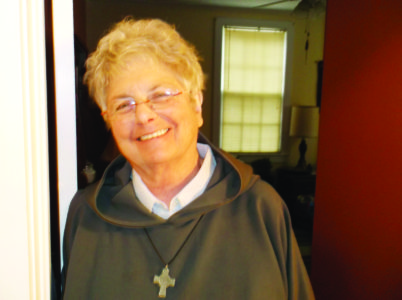
Sister alies therese
From the hermitage
By Sister alies therese
‘The difference between the old Narnia and the new Narnia was a deeper country: every rock and flower and blade of grass looked as if it meant more. I can’t describe it any better than that: if ever you get here you will know what I mean…it was the Unicorn who summed up what everyone was feeling. He stamped his right fore-hoof and neighed, and then cried: I have come home at last! This is my real country! I belong here. This is the land I have been looking for all my life, though I never knew it until now…come further up, come further in!’ (The Last Battle, Chapter 15).
C. S. Lewis invites his readers to reflect ever more deeply upon heaven and the Easter story when in the very last book of the Chronicles of Narnia, he challenges the false and the phony in us and in our world to strip away the masks and costumes that we might live a fuller and more glorious life.
You might remember when Aslan the great lion is executed, taking upon himself the sins of a traitor, in The Lion, the Witch and the Wardrobe. This is his first written book but second in the series, a powerful analogy of the passion, death and resurrection of Jesus. The witch and her “Deep Magic” reminded him that the traitor belonged to her and he stepped up and said, ‘Fall back, all of you and I will talk to the witch alone…you can all come back I have settled the matter. She has renounced her claim on your brother’s blood…’ Later that night the girls came to him and saw him, thinking him ill. ‘What is wrong, dear Aslan? Can’t you tell us? Are you ill?…No I am sad and lonely. Lay your hands on my mane so I can feel you are there and let us walk like that.’ They walked for quite a spell and then he said: ‘O children, children. Here you must stop. And whatever happens, do not let yourself be seen. Farewell.’” And he walked out to the crowd of haters gathered around the Stone Table and let himself be bound and shaved and muzzled. Then he was tied. She came to him, whet her knife, and delivered the blow after saying: “And now, who has won? Fool, did you think that by all this you would save the human traitor? Now I will kill you instead of him as our pact was and so the Deep Magic will be appeased. But when you are dead what will prevent me from killing him as well? And who will take him out of my hands then? Understand that you have given me Narnia forever, you have lost your own life, and you have not saved his. In that knowledge, despair and die.”
She knew nothing of resurrection.
“There, in the sunrise, larger than they had seen him before, shaking his mane (for it had grown again) stood Aslan himself… ‘aren’t you dead?…Not now!…Oh, you’re real, you’re real!’ And both girls flung themselves upon him and covered him with kisses!” And then he explained: ‘though the witch knew the Deep Magic, there is a magic deeper still which she did not know. Her knowledge goes back only to the dawn of time. But if she could have looked a little further back, in the stillness and the darkness before time dawned, she would have read there a different incantation. She would have known that when a willing victim who committed no treachery was killed in a traitor’s stead, the table would crack and Death itself would start working backwards…’
Shall we never forget that ‘magic’ that truth fundamental to all Christian belief: Jesus was raised from the dead. Death met its match. We, the traitors, are set free. It has only been two weeks since Easter Sunday…have we already forgotten, or have we been moving further up and further in?
Julian of Norwich, whose feast day is May 8, reminds us in her Revelations of Divine Love, that sin results in an abyss of nothingness and endless disorder. She emphasizes the immanence of God.
‘See, I am God. See, I am in all things. See, I do all things. See, I never remove my hands from My works, nor ever shall without end. See, I guide all things to the end that I ordain them for, before time began, with the same power and wisdom and love with which I made them. (3:11.199).’
Julian sees creation as gift and promise, according to Kerrie Hide, and God is the source and ground of all things, creation’s hope and destiny. ‘All shall be well, and All shall be well, and All shall be well. ‘What is impossible to you is not impossible to Me. I shall preserve My word in everything and I shall make everything well.’ (13:32.233).’
Perhaps she knew Aslan, the great lion? What they both tell us is to go further up and further in where we will discover where our real country is, where we really belong!
Blessings.
(Sister Alies Therese is a vowed Catholic solitary who lives an eremitical life. Her days are formed around prayer, art and writing. She is author of six books of spiritual fiction and is a weekly columnist. She lives and writes in Mississippi.)
